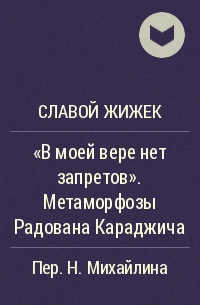
Автор
Славой Жижек - все книги по циклам и сериям | Книги по порядку
- 109 произведений
- 86 изданий на 7 языках
-
Хрупкий абсолют Славой Жижек
ISBN: 5-901116-07-0 Год издания: 2004 Издательство: Художественный журнал Язык: Русский В книге "Хрупкий абсолют" Славой Жижек продолжает начатый в его предыдущих исследованиях анализ условий существования современного человека. Условия эти предопределены, в частности, исчезновением стран реального социализма и капиталистической -
Ирак. История про чайник Славой Жижек
ISBN: 5-901574-41-9 Год издания: 2004 Издательство: Праксис Язык: Русский РазвернутьПытаясь объяснить странную логику работы сновидений, Фрейд приводил известный анекдот о чайнике: 1) я никогда не брал твоего чайника; 2) я вернул тебе его целым и невредимым; 3) чайник уже был дырявым, когда я взял его у тебя. Та же самая логика, как утверждает в своей новой книге Славой Жижек, лежит в основе оправдания войны в Ираке: сначала мистическая связь между Аль-Каидой и Саддамом была превращена в угрозу для всего Ближнего Востока, а затем, непонятным образом, стала угрозой для всех и каждого (а для США и Великобритании в особенности). Когда же оружие массового поражения обнаружить так и не удалось, та же странная логика…
-
Добро пожаловать в пустыню реального Славой Жижек
ISBN: 5-7333-0220-8 Год издания: 2002 Издательство: Прагматика Культуры Язык: Русский Сегодня все основные понятия, используемые нами для описания существующего конфликта, — "борьба с террором", "демократия и свобода", "права человека" и т. д. и т. п. — являются ложными понятиями, искажающими наше восприятие ситуации вместо того, чтобы позволить нам ее понять. В этом смысле сами наши «свободы» служат тому, чтобы скрывать и поддерживать нашу глубинную несвободу. -
The Indivisible Remainder: On Schelling and Related Matters Slavoj Zizek
ISBN: 1844675815 Год издания: 2007 Издательство: Verso Язык: Английский F.W.J. Schelling, the German idealist who for too long dwelled in the shadow of Kant and Hegel, was the first to formulate the post-idealist motifs of finitude, contingency and temporality. His unique work announces Marx’s critique of speculative idealism, as well as the properly Freudian notion of drive, of a blind compulsion to repeat which can never be sublated in the ideal medium of language.
The Indivisible Remainder begins with a detailed examination of the two works in which Schelling’s speculative audacity reached its peak: his essay on human freedom and his drafts on the “Ages of the World.” After reconstituting their line of argumentation, Slavoj Žižek confronts Schelling with Hegel, and concludes by throwing a Schellingian light on some “related matters”: the consequences of the computerization of daily life for sexual experience; cynicism as today’s predominant form of ideology; the epistemological deadlocks of quantum physics.
Although the book is packed with examples from politics and popular culture — the unmistakable token of Žižek’s style — from Speed and Groundhog Day to Forrest Gump, it signals a major shift towards a systematic concern with the basic questions of philosophy and the roots of the crisis of our late-capitalist universe, centred around the enigma of modern subjectivity. -
Zizek's Jokes: Did You Hear the One about Hegel and Negation? Slavoj Zizek
ISBN: 978-0-262-02671-0 Год издания: 2014 Издательство: The MIT Press "A serious and good philosophical work could be written consisting entirely of jokes." -- Ludwig Wittgenstein
The good news is that this book offers an entertaining but enlightening compilation of Žižekisms. Unlike any other book by Slavoj Žižek, this compact arrangement of jokes culled from his writings provides an index to certain philosophical, political, and sexual themes that preoccupy him. Žižek's Jokes contains the set-ups and punch lines -- as well as the offenses and insults -- that Žižek is famous for, all in less than 200 pages. So what's the bad news? There is no bad news. There's just the inimitable Slavoj Žižek, disguised as an impossibly erudite, politically incorrect uncle, beginning a sentence, "There is an old Jewish joke, loved by Derrida..." For Žižek, jokes are amusing stories that offer a shortcut to philosophical insight. He illustrates the logic of the Hegelian triad, for example, with three variations of the "Not tonight, dear, I have a headache" classic: first the wife claims a migraine; then the husband does; then the wife exclaims, "Darling, I have a terrible migraine, so let's have some sex to refresh me!" A punch line about a beer bottle provides a Lacanian lesson about one signifier. And a "truly obscene" version of the famous "aristocrats" joke has the family offering a short course in Hegelian thought rather than a display of unspeakables. Žižek's Jokes contains every joke cited, paraphrased, or narrated in Žižek's work in English (including some in unpublished manuscripts), including different versions of the same joke that make different points in different contexts. The larger point being that comedy is central to Žižek's -
Event: Philosophy in Transit Славой Жижек
ISBN: 978-1-846-14626-8 Год издания: 2014 Издательство: Penguin Books Ltd. Язык: Русский In the second in a new series of accessible, commute-length books of original thought, Slavoj Zizek, one of the world's greatest living philosophers, examines the new and highly contested concept of Event.
An Event can be an occurrence that shatters ordinary life, a radical political rupture, the emergence of a religious belief, the rise of a new art form, or an intense experience such as falling in love. After an Event, nothing remains the same, even if there are no obvious large changes.
Taking us on a trip which stops at different definitions of Event, Zizek addresses fundamental questions such as: How much are we agents of our own fates? Which conditions must be met for us to perceive something as really existing? In a world that's constantly changing, is anything new really happening?
Drawing on references from Plato to arthouse cinema, the Big Bang to Buddhism, Event is a journey into philosophy at its most exciting and elementary. -
The Monstrosity of Christ: Paradox or Dialectic? Славой Жижек, John Milbank, Creston Davis
ISBN: 978-0-262-51620-4 Год издания: 2009 Издательство: The MIT Press Язык: Русский "What matters is not so much that Zizek is endorsing a demythologized, disenchanted Christianity without transcendence, as that he is offering in the end (despite what he sometimes claims) a heterodox version of Christian belief." - John Milbank "To put it even more bluntly, my claim is that it is Milbank who is effectively guilty of heterodoxy, ultimately of a regression to paganism: in my atheism, I am more Christian than Milbank." - Slavoj ZizekIn this corner, philosopher Slavoj Zizek, a militant atheist who represents the critical-materialist stance against religion's illusions; in the other corner, "Radical Orthodox" theologian John Milbank, an influential and provocative thinker who argues that theology is the only foundation upon which knowledge, politics, and ethics can stand. In The Monstrosity of Christ, Zizek and Milbank go head to head for three rounds, employing an impressive arsenal of moves to advance their positions and press their respective advantages. By the closing bell, they have not only proven themselves worthy adversaries, they have shown that faith and reason are not simply and intractably opposed. Zizek has long been interested in the emancipatory potential offered by Christian theology. And Milbank, seeing global capitalism as the new century's greatest ethical challenge, has pushed his own ontology in more political and materialist directions. Their debate in The Monstrosity of Christ concerns the future of religion, secularity, and political hope in light of a monsterful event-God becoming human. For the first time since Zizek's turn toward theology, we have a true debate between an atheist and a theologian about the very meaning of theology, Christ, the Church, the Holy Ghost, Universality, and the foundations of logic. The result goes far beyond the popularized atheist/theist point/counterpoint of recent books by Christopher Hitchens, Richard Dawkins, and others. Zizek begins, and Milbank answers, countering dialectics with "paradox." The debate centers on the nature of and relation between paradox and parallax, between analogy and dialectics, between transcendent glory and liberation. Slavoj Zizek is a philosopher and cultural critic. He has published over thirty books, including Looking Awry, The Puppet and the Dwarf, and The Parallax View (these three published by the MIT Press). John Milbank is an influential Christian theologian and the author of Theology and Social Theory: Beyond Secular Reason and other books. Creston Davis, who conceived of this encounter, studied under both Zizek and Milbank. -
Looking Awry – An Introduction to Jacques Lacan Through Popular Culture Slavoj Zizek
ISBN: 9780262240314 Год издания: 1991 Язык: Английский Looking Awry – An Introduction to Jacques Lacan Through Popular Culture -
The Monstrosity of Christ – Paradox or Dialectic? Slavoj Zizek
ISBN: 9780262012713 Год издания: 2009 Язык: Английский The Monstrosity of Christ – Paradox or Dialectic? -
The Puppet & the Dwarf – The Perverse Core of Christianity Slavoj Zizek
ISBN: 9780262740258 Год издания: 2003 Язык: Английский The Puppet & the Dwarf – The Perverse Core of Christianity -
Looking Awry – An Introduction to Jacques Lacan Through Popular Culture (Paper) Slavoj Zizek
ISBN: 9780262740159 Год издания: 1992 Язык: Английский Looking Awry – An Introduction to Jacques Lacan Through Popular Culture (Paper) -
How to Read Lacan Slavoj Zizek
ISBN: 9780393329551 Год издания: 2007 Язык: Английский How to Read Lacan

















